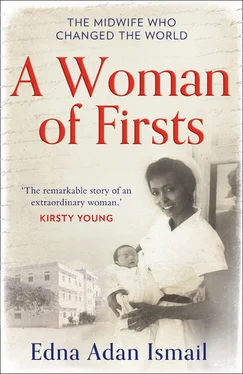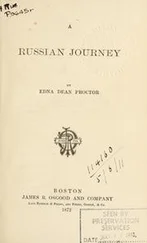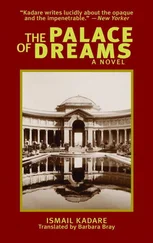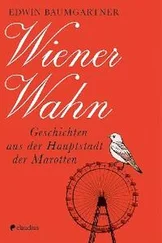The first I knew that I was going to be educated was when my parents asked me if I’d like to go home with my cousins after their summer holiday that year. It must have been 1945, and although the war was still going on elsewhere, our corner of Africa was safe.
‘Really?’ I asked, astonished.
‘Yes, really,’ my father confirmed. ‘Well, you want to go to school, don’t you?’
This momentous event happened in my eighth year, which proved to be the most significant of my entire life. Going to a proper school for the first time felt like such a milestone. I had never been out of Somaliland, so from the moment I left my eyes were like saucers at the wonder of it all. To make ends meet, Aunt Cecilia worked as a dressmaker and a teacher in a domestic science school. For extra income, she took me in and, later, my brother Farah. She also homed my cousins Gracie and her brother Maurice – the motherless children of an uncle whose wife had died in childbirth – all of us sharing one large apartment that was permanently filled with music, chatter and noise. My aunt was a most resourceful woman and another powerful role model. She had the energy of twenty horses and her determination helped shape me.
Cecilia ran our lives like a military operation. Speaking only English and French so that I’d learn my two new languages quickly, she paired me up with the older kids to do chores such as polish our shoes and make our own beds. We sat at the big table in the living room to do our homework after school, and in the evenings we learned how to crochet or knit by the light of Tilley lamps. If we wanted her to make us something to wear then we had to hem it ourselves, sew the buttons on, and fold it neatly for her – or there would be no garment. My mother never taught me things like that, so I didn’t take to everything at first but soon got the hang of it.
My first day at the École de la Nativité run by Franciscan nuns in white habits was overwhelming chiefly because it was full of white kids, and most of them boys. I had only ever seen one or two white people before – men who sometimes worked with Dad – but I don’t think I’d ever seen white children. There must have been over a hundred pupils in the school – French, Somali, American, Italian, Greek, Jewish, Armenian, Ethiopian, and a few Arabs from Yemen. I was the only girl from Somaliland. Boys and girls sat together in the same class, a fact that further inflamed my relatives back in Somaliland who considered this lack of segregation scandalous. My mother Marian, already the target of their criticism, could only sigh and blame my father once more. How she must have longed for a ‘normal’ daughter who’d stay home, learn to cook, marry young and produce a healthy brood of grandchildren.
There was so much to take in at the École and my brain was like a sponge, soaking up everything. My cousin Madeleine, who was four years my senior (and my childhood heroine), attended the same school, so I didn’t have to face it alone. The hardest thing to deal with was that overnight my world suddenly became French and I learned about Napoleon, Jeanne d’Arc, the three Louis’ and Charlemagne in a language that was foreign to me. I studied the geography of France, recited the prayers of the French catechism and learned more about Islam. I was taught respect for all beings, all faiths. After a faltering start, I did well enough to jump up a year in my class and then again.
Life in Djibouti City opened up a whole new world to me. I couldn’t wait to start my day and learn something new; I wanted to experience all that life had to offer. I was forever running around with loads of energy and few, if any, inhibitions. The nuns, each known as Sister (or in French Soeur) were all very different. I met one of them, Marie Thérèse who taught us maths and became Mother Superior, again in 1991 and asked if she remembered me. She grimaced, ‘Of course, Edna – you were toujours turbulente !’
Little did she know just how turbulent I would become.
Hargeisa, British Somaliland, 1946
The summer of 1946 marked my first visit home after living in French Somaliland for one year. I was still only eight years old and little did I know that this would be the year that my life changed for ever. It felt good to be home as I had missed my grandmothers and my father especially. I couldn’t wait to tell Dad my news and share all that I’d learned in school.
The strangest thing about being back was that I had a new perspective. My time in a French-run co-educational and largely secular environment had shown me that girls could participate in life as fully as boys, so to return to a place that put so many constraints on my gender felt all the more difficult to accept. None of the local girls I’d left behind were ever seen outside their homes and only the boys seemed to have any freedom – or fun. The camels had more freedom than we did.
When I was growing up I’d noticed something else unusual about the girls in our district. There was a mysterious event that made them disappear for a month or so and when they returned they were different – far more subdued and not participating as much as they’d done before. I thought that maybe they’d been ill and slow to recover, or that their mothers had warned them to behave in a more adult manner. Usually I was too busy playing with the boys to worry too much about why any one girl was acting strangely.
Circumcision for boys was an accepted part of our society, although I had little or no understanding of it. We’d often see the boys walk around gingerly afterwards in their lunghis or long overshirts, carefully holding the cloth away from their groins. As I had no knowledge of the human anatomy, periods or anything like that I didn’t associate what had happened to them with their genitals. In any event, it was an unwritten rule in our society that we never discussed such matters. We girls were especially ignorant and blind so, despite being an inquisitive child, I knew nothing of the traditional rites and rituals because all that was one big secret.
One day that summer, I found myself alone in the house with my mother. My brother was in Borama visiting our grandparents and Dad was out of town visiting the nomads for a few days. These were people who’d often never seen a doctor in their lives and managed any health problems as best they could or with the ministrations of traditional herbalists, bone-setters and spiritual healers. The sick often fell prey to quack ‘pharmacists’ who sold them anything from pills to ward off the evil eye or an injection with something that could potentially be fatal. Whenever my father returned from these trips he’d be exhausted.
That particular morning after he’d left I awoke to find our house bustling with unusual commotion. For some reason, several women – cousins, neighbours, and relatives I called ‘aunts’ – had dropped in to talk with my mother and my Grandmother Baada. There was much hushed chatter and conversations clearly not meant for my ears. ‘Why don’t you go play outside?’ Mum said when she caught me trying to listen in, and – although surprised – I was more than happy to oblige.
Early the following morning, one of my mother’s friends turned up at the house with a strange old woman I’d never seen before, and a fattened sheep. These were only ever brought to the house for feast days and, as far as I knew, this wasn’t one of them, so I was even more mystified. Odder still, Mum told me to take a shower, after which I assumed I’d be expected to put on my best clothes. ‘No, no. Wear a clean nightdress,’ she instructed. How peculiar, I thought. Equally strange, my bed was pushed into a corner of my bedroom and a mat laid on the floor. Someone placed a stool in the corridor and when I emerged from the shower room I found a group of women standing around it waiting for me. Smiling shyly at them, I wondered what was happening and then I realized with a pang of hunger that no one had prepared me any breakfast that morning.
Читать дальше












